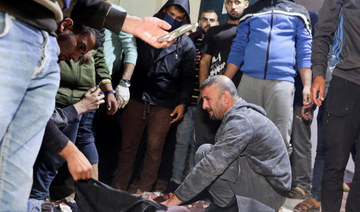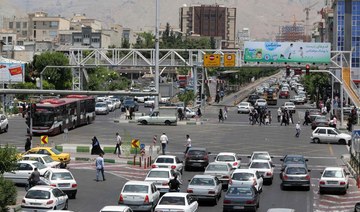NEW DELHI: A standoff with nuclear rival Pakistan appears to have given Indian Prime Minister Narendra Modi, head of the Hindu nationalist Bharatiya Janata Party, a boost ahead of national elections set to begin in April.
After a suicide bombing killed 40 soldiers in Indian-controlled Kashmir, India’s air force launched a strike on an alleged terrorist training camp inside Pakistan.
Although India has refused to produce evidence of the damage it says was caused by the strike, BJP and Modi supporters immediately branded it a decisive victory.
The crisis managed to turn attention away from Modi’s economic record.
Modi swept 2014 elections promising to reform India’s economy, but his signature demonetization policy, intended to reduce money laundering, choke terrorist financing and boost digital payments, has been largely deemed a failure.
And a small scandal erupted earlier this year when a respected financial newspaper reported that the government was suppressing jobs data that showed India’s unemployment rate at its highest level in 45 years.
But Modi, 68, seems to have regained ground after taking a tough stance in brinkmanship with Pakistan, even though violence and massive protests continue to rock Indian-controlled Kashmir, where insurgent groups have been fighting for independence or a merger with Pakistan since 1989.
Making the most of the confrontation with Pakistan and his party’s efforts to project him as a strong leader, Modi has been crisscrossing India addressing rallies and claiming that his government’s response to the suicide bombing shows that a “New India” is emerging.
Boasting of his “muscular” policy, Modi said at one recent rally that India “will go and hit people inside their homes who try to harm” the country.
At rallies, he has been comparing his policies with those of earlier governments, denouncing the Congress party-led government for not retaliating after attacks in Mumbai in 2008. India blamed a Pakistan-based militant group for the attacks that killed 166 people.
His fiery speeches are a clear indication that national security will be a key issue in his campaign and that the BJP believes it will help swing enough votes to win him a second term.
His supporters are using social media and several television news channels to fan nationalist sentiment and label anyone who questions Modi as unpatriotic, particularly during television debates where hysteria reigns.
The inflammatory rhetoric is brushing aside key economic issues that affect the nearly 70 percent of India’s 1.3 billion people who live in rural areas.
“I wouldn’t say the BJP leaders will completely abandon economic issues. But they definitely are going for a mix of Hindu nationalism, terrorism and a very strong pitch against Pakistan. What was missing was so far was a national threat to bind the BJP campaign,” said Nilanjan Mukhopadhyay, a political analyst who has written a biography of Modi.
Modi became prime minister in 2014 promising inclusive economic development, the creation of 10 million jobs every year, double-digit economic growth, and an end to farmers’ distress caused by low prices for their produce.
But the opportunity was missed owing to the demonetization and the haphazard implementation of a Goods and Services Tax. To make matters worse, the unemployment rate hit a 45-year high of 6.1 percent in the last fiscal year.
Modi’s party suffered defeats in three major state elections in Rajasthan, Madhya Pradesh and Chhattisgarh in December at the hands of the Congress party, led by 48-year-old Rahul Gandhi.
Buoyed by these wins, Gandhi’s style became more aggressive. His criticisms of Modi over farmers’ continued distress and unemployment were gaining some traction before tensions broke out with Pakistan. He also had been making efforts to rally various opposition parties into a united anti-Modi front.
The Congress party is in no position to win the election on its own. Polls suggest Gandhi’s party can hope to win seats in between eight and 10 out of India’s 29 states. In the others, it will have to depend on the support of regional groups.
But things changed after India’s strike into Pakistan territory. Modi’s claims of victory allowed him to take back control of the narrative from Gandhi, leaving the latter and other opposition leaders slightly uncertain about how to deal with Modi.
First they supported the government action against Pakistan and praised the actions of security forces.
Within days, however, they started criticizing Modi for not calling an all-party meeting to discuss security issues. Soon, conflicting government accounts of the damage caused in Pakistan by the Indian strike gave them more ammunition to attack Modi.
But Modi used their doubts about the strike to polish his own “strongman” credentials.
While his current position looks quite strong, the latest surveys say he might have to settle for a thinner majority this time. A survey by C-Voter predicts that Modi and his allies could win 265 seats, just seven short of the halfway mark, while an India TV-CNX survey gives them a clear majority with 285 seats.
Pakistan standoff helps India’s Modi shift focus from jobs
Pakistan standoff helps India’s Modi shift focus from jobs
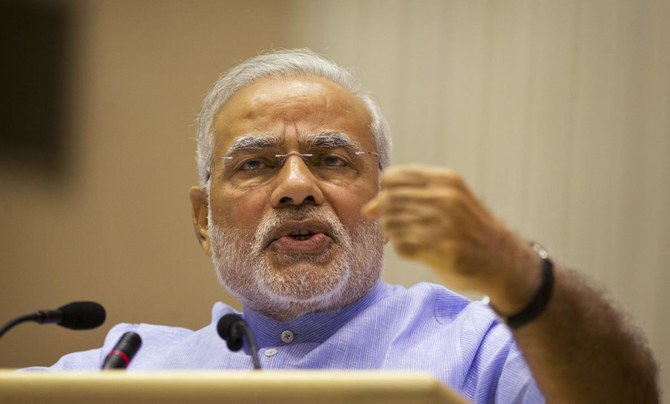
- India’s air force launched a strike on an alleged terrorist training camp inside Pakistan
- The crisis has helped the Hindu nationalist Bharatiya Janata Party-led government to turn attention away from its mixed record on the economy
Kenya, Tanzania brace for cyclone as heavy rains persist
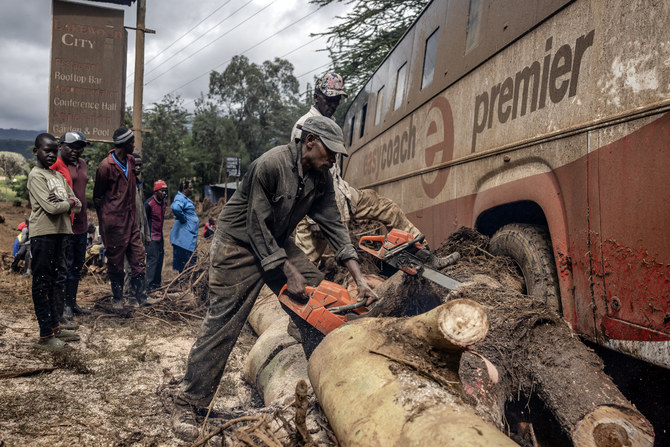
- The two East African neighbors are still recovering from last weeks devastating floods
- Kenya reported about 200 dead while Tanzaia said at least 155 died in floods and landslides
NAIROBI: Kenya and Tanzania were bracing Thursday for a cyclone on the heels of torrential rains that have devastated East Africa, killing more than 350 people and forcing tens of thousands from their homes.
In addition to claiming 188 lives in Kenya since March, the floods have displaced 165,000 people, with 90 reported missing, the interior ministry said, as the government warned citizens to remain on alert.
“Crucially, the coastal region is likely to experience Cyclone Hidaya, which will result in heavy rainfall, large waves and strong winds that could affect marine activities in the Indian Ocean,” the office of Kenyan President William Ruto said.
Neighbouring Tanzania, where at least 155 people have been killed in flooding and landslides, is also expected to feel the force of Hidaya.
“The presence of Hidaya Cyclone... is expected to dominate and affect the weather patterns in the country including heavy rain and strong winds in some Regions near Indian Ocean,” Tanzania Red Cross Society said on X, formerly Twitter.
Kenya’s capital Nairobi is among the areas expected to suffer heavy rains over the next three days, the Kenya Meteorological Department said on X, warning of strong winds and large ocean waves along the country’s coastline.
The forecaster urged residents to be vigilant for flash floods and lightning strikes, adding that strong winds could “blow off roofs, uproot trees” and cause other damage.
The heavier than usual rains have also claimed at least 29 lives in Burundi, with 175 people injured, and tens of thousands displaced since September last year, the United Nations said.
Earlier this week Ruto announced he was deploying Kenya’s military to evacuate everyone living in flood-prone areas.
In a bulletin released Thursday evening, the interior ministry ordered anyone living close to major rivers or near 178 “filled up or near filled up dams or water reservoirs” to vacate the area within 24 hours, warning that they would otherwise face “mandatory evacuation for their safety.”
The devastation has also affected Kenya’s tourism sector — a key economic driver — with some 100 tourists marooned in the famed Maasai Mara wildlife reserve on Wednesday after a river overflowed, flooding lodges and safari camps.
Rescuers later managed to evacuate 90 people by ground and air, the interior ministry said.
The area is currently inaccessible with bridges washed away, Narok West sub-county administrator Stephen Nakola told AFP, adding that about 50 camps in the reserve have been affected, putting more than 500 locals temporarily out of work.
There are no fatalities but communities living around the area have been forced to move away.
“Accessing the Mara is now a nightmare and the people stuck there are really worried, they don’t have an exit route,” Nakola said, adding that waterborne diseases were likely to emerge.
“I am worried that the situation could get worse because the rains are still on.”
In the deadliest single incident in Kenya, dozens of villagers were killed when a dam burst on Monday near Mai Mahiu in the Rift Valley, about 60 kilometers (40 miles) north of Nairobi.
The interior ministry said 52 bodies had been recovered and 51 people were still missing after the dam disaster.
Opposition politicians and lobby groups have accused Ruto’s government of being unprepared and slow to respond to the crisis despite weather warnings.
“Kenya’s government has a human rights obligation to prevent foreseeable harm from climate change and extreme weather events and to protect people when a disaster strikes,” Human Rights Watch said Thursday.
The United States and Britain have issued travel warnings for Kenya, urging their nationals to be cautious amid the extreme weather.
The devastation has sparked an outpouring of condolences and pledges of solidarity from all over the world, including from Pope Francis and UN Secretary General Antonio Guterres.
The rains have been amplified by the El Nino weather pattern — a naturally occurring climate phenomenon typically associated with increased heat worldwide, leading to drought in some parts of the world and heavy downpours elsewhere.
UK’s foreign secretary supported arms sales to Israel days after British aid workers killed in Israeli strike
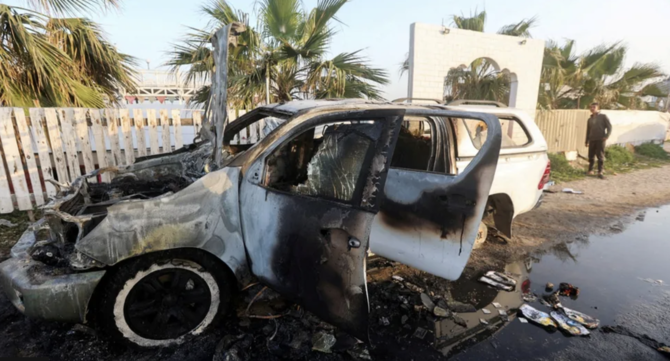
- Attack on World Central Kitchen convoy killed 7 people in total
LONDON: Britain’s foreign secretary recommended that the UK continue selling arms to Israel just days after an Israeli strike on a World Central Kitchen convoy killed three British aid workers.
David Cameron supported the continuation of arms sales two days after the strike on April 1, and the Secretary of State for Business and Trade Kemi Badenoch approved the decision on April 8, The Guardian reported on Thursday.
Cameron said earlier this week that the strike that killed the Britons, in addition to four aid workers of other nationalities, revealed systemic and personal failures by members of the Israel Defense Forces.
Cameron’s decision seems to have been based on an assessment of Israeli compliance with humanitarian law that did not cover the deaths of the aid workers due to a time lag in the government’s process for deciding if British arms exports were at risk of being used to commit war crimes.
There was a possibility that the business department’s assessment did not cover any incidents after Jan. 28.
An update on the handling of arms export licenses that took into consideration events up until the end of February was prepared, but the British Foreign Office has declined to say if that was included in the advice given to ministers.
Opposition Labour MPs claim the time delay means there is a possibility that no comprehensive ministerial-level assessment of Israel’s conduct of the war in Gaza has been made in the last three months.
Lawyers and campaigners who have examined the evidence provided by the Foreign Office have come to the same conclusion.
World Central Kitchen said on Monday it would resume operations in the Gaza Strip, a month after the Israeli airstrike.
Prior to halting operations, WCK had distributed more than 43 million meals in Gaza since October, representing by its own accounts 62 percent of all international nongovernmental aid.
NATO condemns Russian ‘malign activities’ on its territory

- The incidents “are part of an intensifying campaign of activities” Russia is carrying out across the Euro-Atlantic area
- NATO allies “express their deep concern over Russia’s hybrid actions, which constitute a threat to allied security“
BRUSSELS: NATO on Thursday condemned Russian “malign activities” on its territory, saying actions like disinformation, sabotage, violence and cyber interference threatened the alliance’s security.
The incidents “are part of an intensifying campaign of activities” Russia is carrying out across the Euro-Atlantic area and NATO allies “express their deep concern over Russia’s hybrid actions, which constitute a threat to allied security,” NATO said in a statement.
Authorities in the Czech Republic, Estonia, Germany, Latvia, Lithuania, Poland and Britain have recently investigated and charged people in connection with “hostile state activity.”
NATO said allies would work together to deter and defend against the hybrid actions and that they would remain steadfast in supporting Ukraine as it struggles to fend off Russia’s invasion, now in its third year.
Last month, a 20-year-old British man was charged with masterminding an arson plot against a Ukrainian-linked target in London. Moscow’s ambassador Andrey Kelin dismissed claims of links to Russia as “absurd” and “unfounded.”
In late March, Czech authorities said they had busted a Moscow-financed network that spread Russian propaganda and wielded influence across Europe, including in the European Parliament.
Israeli private eye arrested in UK over alleged hacking for US PR firm

- An initial attempt to extradite Amit Forlit to the United Sates was thrown out by a judge at Westminster Magistrates’ Court on Thursday
- Forlit was arrested under an Interpol red notice at London’s Heathrow Airport
LONDON: An Israeli private investigator wanted by the United States was arrested in London over allegations that he carried out a cyberespionage campaign on behalf of an unidentified American PR firm, a London court heard on Thursday.
An initial attempt to extradite Amit Forlit to the United Sates was thrown out by a judge at Westminster Magistrates’ Court on Thursday on a legal technicality.
Amy Labram, a lawyer representing the United States, had told the court that Forlit “is accused of engaging in a hack for hire scheme.”
Labram said that the US allegations include that an unnamed Washington-based PR and lobbying firm paid one of Forlit’s companies 16 million pounds ($20 million) “to gather intelligence relating to the Argentinian debt crisis.”
Forlit was arrested under an Interpol red notice at London’s Heathrow Airport as he was trying to board a flight to Israel, according to the USauthorities.
Forlit is wanted in the US on three charges: one count of conspiracy to commit computer hacking, one count of conspiracy to commit wire fraud and one count of wire fraud.
A judge ruled that the attempt to extradite Forlit by the United States could not continue as he was not produced at court within the timeframe required under British extradition law.
“He was not produced at court as soon as practicable and the consequences of that ... he must – I have no discretion – he must be discharged,” Judge Michael Snow ruled.
Forlit and his lawyer did not immediately return messages seeking comment. The Federal Bureau of Investigation did not immediately return a message.
Forlit has separately been accused of computer hacking in New York by aviation executive Farhad Azima. Azima, whose emails were stolen and used against him in a 2020 trial in London, is suing Forlit and others in federal court in Manhattan.
Forlit has previously acknowledged retrieving Azima’s emails but has denied hacking, telling Reuters he innocently stumbled across the messages “on the web.”
Death toll jumps to at least 48 as a search continues in southern China highway collapse
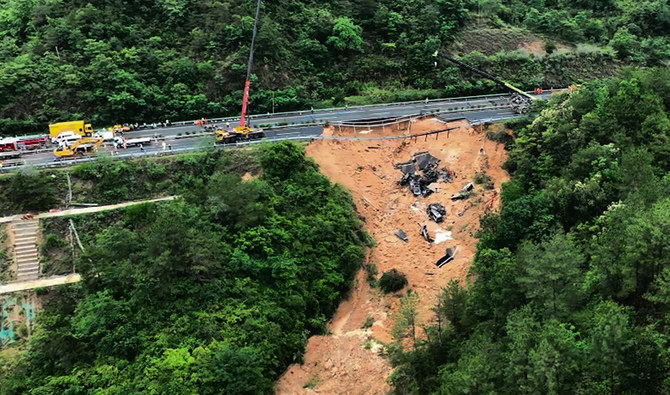
- One side of four-lane highway in Meizhou city gave way after a month of heavy rains
- Twenty-three vehicles fell down a steep slope, some sending up flames as they caught fire
BEIJING: The death toll from a collapsed highway in southeastern China climbed to 48 on Thursday as searchers dug for a second day through a treacherous and mountainous area.
One side of the four-lane highway in the city of Meizhou gave way about 2 a.m. on Wednesday after a month of heavy rains in Guangdong province. Twenty-three vehicles fell down a steep slope, some sending up flames as they caught fire. Construction cranes were used to lift out the burnt-out and mutilated vehicles.
Officials in Meizhou said three other people were unidentified, pending DNA testing. It wasn’t immediately clear if they had died, which would bring the death toll to 51. Another 30 people had non-life-threatening injuries.
The search was still ongoing, Meizhou city Mayor Wang Hui said at a late-afternoon news conference. No foreigners have been found among the victims, he said.
Search work has been hampered by rain and land and gravel sliding down the slope. The disaster left a curving earth-colored gash in the otherwise verdant forest landscape. Excavators dug out a wider area on the slope.
“Because some of the vehicles involved caught fire, the difficulty of the rescue operation has increased,” said Wen Yongdeng, the Communist Party secretary for the Meizhou emergency management bureau.
“Most of the vehicles were buried in soil during the collapse, with a large volume of soil covering them,” he said.
He added that the prolonged heavy rainfall has saturated soil in the area, “making it prone to secondary disasters during the rescue process.”
Over 56 centimeters (22 inches) of rain has fallen in the past four weeks in the county where the roadway collapsed, more than four times as much as last year. Some villages in Meizhou flooded in early April, and the city has seen more rain in recent days.
Parts of Guangdong province have seen record rains and flooding in the past two weeks, as well as hail. A tornado killed five people in Guangzhou, the provincial capital, during rain and hail storms last weekend.
The highway section collapsed on the first day of a five-day May Day holiday, when many Chinese are traveling at home and abroad.
Chinese leader Xi Jinping said that all of China’s regions should improve their monitoring and early warning measures and investigate any risks to ensure the safety of the public and social stability, state broadcaster CCTV said.






